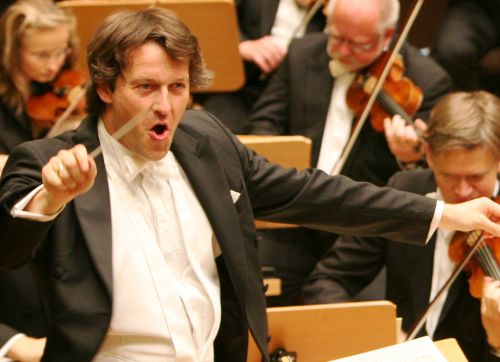 Germany Richard Strauss: Undine Röhner-Stolle (oboe), Ralf-Carsten Brömsel (violin), Markus Gundermann (violin), Christina Biwank (viola), Hanno Felthaus (viola), Matthias Bräutigam (cello), Hans-Jörg Pohl (cello), Dresdner Philharmonie/Markus Poschner, Albertinum, Dresden. 7.6.2014 (MC)
Germany Richard Strauss: Undine Röhner-Stolle (oboe), Ralf-Carsten Brömsel (violin), Markus Gundermann (violin), Christina Biwank (viola), Hanno Felthaus (viola), Matthias Bräutigam (cello), Hans-Jörg Pohl (cello), Dresdner Philharmonie/Markus Poschner, Albertinum, Dresden. 7.6.2014 (MC)

Sextet from Capriccio
Oboe Concerto
Ein Heldenleben (A Hero’s Life)
During this 150thanniversary year I’ve lost count of the number of all-Richard Strauss concerts I have seen and I did wonder if I would be feeling jaded by now. All-Richard Strauss concerts are still coming thick and fast I actually feel energised, such is the enjoyment to be gained from one of Germany’s greatest musical sons.
I attended concerts by the Dresdner Philharmonie twice last season but this was the first time I had seen them play in the Albertinum, a Renaissance Revival building, which has had its inner courtyard roofed to form a rectangular atrium suitable for concerts. The acoustic in the Albertinum was satisfactory. I attended a concert there last season and from a similarly positioned seat last night the sound, not the most subtle around, just seemed to come straight at you. It wasn’t the sound that was problematic for this Dresdner Philharmonie it was the heat as Dresden has been sweltering in summer sun for several days and the Albertinum doesn’t seem to be air conditioned.
Tonight Undine Röhner-Stolle was soloist in the Strauss Oboe Concerto and she seemed to be affected by the heat from her position at the front of the stage. Although melting in the heat Röhner-Stolle didn’t let it affect her playing, delivering a most assured performance in this demanding score full of romantic feeling and colour. The work was inspired by an American GI, stationed in Garmisch, near Strauss’ home, who was an oboist for the Pittsburgh orchestra – but he never got to premiere it. I would never claim the concerto to be one of Strauss’ finest works but it is worth hearing from time to time and Röhner-Stolle’s playing made the finest possible case for the score. Deliberately moderate in size the orchestra still sounded opulent with conductor Markus Poschner ensuring the sound never overpowered the soloist. (Sadly veteran conductor Rafael Fruhbeck de Burgos who was to take the concert is in poor health and no longer conducting, ans so was replaced by Markus Poschner.)
Undoubtably the highlight of the concert was Ein Heldenleben (A Hero’s Life) one of Strauss’ most popular scores and his final symphonic poem. Strauss composed the work in 1899, a productive time right after completing Don Quixote. Portraying an artist’s life the work is understood as musical autobiography which reflects the composer’s fixation with the Nietzschean ideology. Under the assured baton of Markus Poschner Ein Heldenleben was given a thrilling, twenty four carat gold performance. The massive orchestra, including eight horns, five trumpets and five trombones that Strauss demands for his imaginary hero was held together by Maestro Poschner’s unfaltering direction. Strauss excels with his striking range of orchestral colour and a sumptuously ripe sensuality predominates the writing.Packed with incident as it was I was able to hear a remarkable amount of rarely perceptible orchestral detail even if the non-tiered layout of the stage meant I was unable to see it. Held in the memory is the effect of the off-stage trumpets sounding like distant hunting horns, the wonderful expression of the gloriously unified strings and the highly testing dialogue between the leader’s violin and horn which was quite delightfully played.
The concert had opened on an elegant if unspectacular note with the Sextet from Strauss’ final opera Capriccio. I would have much preferred something heavier, and more exciting to open the concert, such as Till Eulenspiegels lustige Streiche, something from Rosenkavalier, maybe even the rarely heard Concert Overture in C minor or the Japanische Festmusik. Nevertheless the Capriccio Sextet with its mellow stream of melodies was marvellously played with leader Ralf-Carsten Brömsel demonstrating his undoubted prowess. With the exception of the pair of cellists, the remaining players performed standing adding weight to the sound.
Michael Cookson